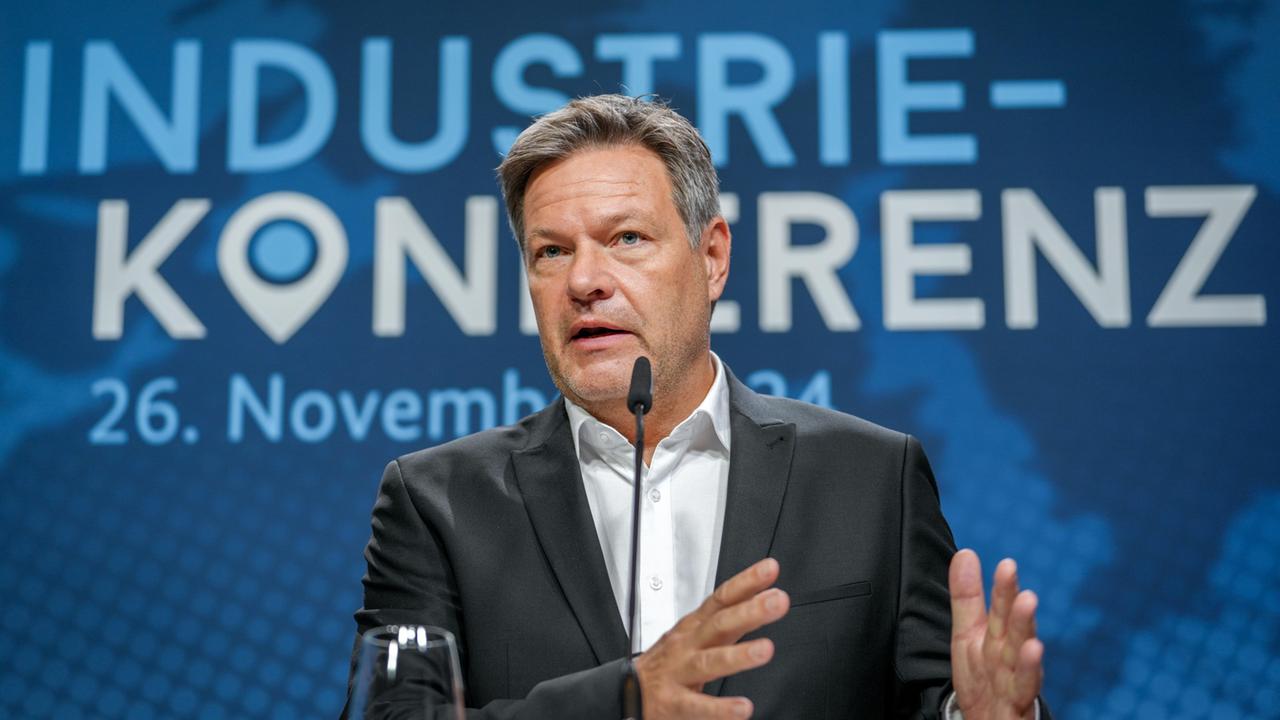exclusive
PFAS chemicals should be restricted. But hundreds of companies are fighting hard to continue using the chemicals. New research shows that key politicians are adopting false lobbying claims.
The impressively high, glass-roofed inner courtyard is just a few hundred meters from the Brandenburg Gate. Here, at the Bavarian state representation in Berlin, some of Germany's most important companies will meet with government representatives, including from the Federal Ministry of Economics, at the end of January 2024. There is butter pretzel as a welcome, but after that things quickly become more serious – and Robert Habeck's Ministry of Economic Affairs brought good news to the companies present. This emerges from an internal document from the ministry NDR, WDR and the Süddeutsche Zeitung could see.
For around three hours, the capital will focus on the controversial per- and polyfluorinated alkyl substances (PFAS), which are important for many different industries: for large chemical companies, but also for manufacturers of pans, outdoor clothing and medical devices. The non-stick properties of the substances ensure that the egg does not burn in the pan, the rain jacket is water-repellent and a medical device slides in the body and does not jerk.
But at the beginning of 2023, Germany, together with four other countries, proposed significantly restricting the entire group of PFAS. Because once the chemicals are in the environment, they stay there for many decades. Some PFAS have been shown to cause cancer, liver damage, endocrine disruption, and damage the immune system.
This project has triggered what is probably the biggest lobbying rush ever seen in Europe. Several thousand letters were sent to the responsible chemicals agency ECHA, totaling almost 70,000 pages. But many of the arguments put forward by the industry are based on false information or misleading studies.
The international “Forever Lobbying Project” has been researching this in recent months, in which NDR, WDR, Süddeutsche Zeitung and the German edition of the MIT Technology Review were also involved. To do this, the team examined thousands of documents, made around 200 requests under the Freedom of Information Act and spoke to numerous insiders and experts.
False information, exaggerated figures, missing evidence
The most important group of PFAS, the so-called fluoropolymers, is particularly hotly contested. These are plastics that have non-stick properties, generate little friction and are therefore used by numerous companies. As a central argument against strict regulation by politicians, industry representatives simply refer to these substances in their lobby papers as so-called “polymers of low concern”, i.e. substances that are of little concern, i.e. not dangerous to health.
The International Organization for Economic Cooperation (OECD) has even confirmed this. The problem: That's not true. At the OECD, from 1993 to 2009, only various expert groups dealt with the substances. When asked, the OECD states that it has “not carried out any assessment of fluoropolymers”. The organization's website also states: “There is no consensus that fluoropolymers are of little concern.”
Apparently to support their narrative, industry representatives refer to two scientific publications almost 1,000 times. These suggest that fluoropolymers are allegedly too large to cause damage to human cells. The authors of the scientific publications were either employed by the industry or were consultants paid by it, i.e. not independent. In it, they primarily refer to the alleged harmlessness of the substances by citing a non-final status at the OECD – a protocol from a group of experts at the OECD from 1993.
Influence on blood donations
In fact, fluoropolymers are generally harmless during the use phase. The debate about this is a smokescreen. The problem is the production and disposal, which regularly leads to environmental contamination, especially through wastewater. Entire areas around factories are contaminated: in the Altötting district in Bavaria, for example, blood donations from residents were no longer allowed to be used for blood supplies.
In Belgium, for example, the provincial government warns residents within a one and a half kilometer radius of the factory not to eat eggs from their own chickens and children should not play on uncovered ground. Because production and disposal are dangerous to the environment, independent researchers do not give fluoropolymers a “low concern” label.
Another central argument from the industry: Fluoropolymers can supposedly be produced in closed systems, i.e. without emissions entering the environment. However, in its central statement, the most important European lobby association for fluoropolymers only makes assertions and does not present any evidence. Experts deny that this is possible. “You can say that, but so far these factories haven't been running that way,” says Martin Scheringer from the Swiss Federal Institute of Technology (ETH) in Zurich. He has been researching PFAS for almost 20 years. There has never been any proof that a perfectly clean transaction is even possible.
Testing all PFAS is hardly possible
Industry officials often advocate for regulating PFAS using a “risk-based” approach. Each substance is tested individually and is only banned if it is proven that it is toxic, affects the genetic material or has other harmful effects. However, this approach has so far led to the regulated PFAS often being replaced by other, very similar, unregulated PFAS.
However, analyzing each of these chemicals to decide whether to ban them would be extremely time-consuming. “That would take centuries. It is absolutely not practical,” explains Martin Scheringer from ETH Zurich.
Habeck Ministry with industry arguments
The industry still seems to be successful with its arguments. Extensive restrictions on PFAS now appear questionable. Federal Economics Minister and Green Party candidate for chancellor Habeck explained in August 2023 that one should not “prevent the development of technologies through over-regulation, especially since they are used in closed systems in production.”
A few weeks later, Chancellor Olaf Scholz invited people to a chemistry summit in the Chancellery. The Chancellery then writes with reference to PFAS that it rejects “blanket, undifferentiated bans on entire classes of substances”. The signals are also noticed abroad. In France, officials expressed surprise during an internal meeting: “The German government announced that a restriction covering all PFAS was not conceivable, which is paradoxical since Germany brought forward the dossier.”
In January 2024, at the meeting in the Bavarian state representation in Berlin, the green Ministry of Economic Affairs brought good news to the industry. In an internal conversation template that NDR, WDR and SZ is available, the ministry notes concessions that were agreed with Federal Minister Habeck. Central point: The Ministry of Economic Affairs wants to exempt fluoropolymers from the restriction. The ministry also refers to the wrong argument, namely that they are “viewed as polymers of low concern”, i.e. as substances that do not cause concern.
When asked where this information came from, the press office replied: from the OECD. This is the organization that has made it clear that it never claimed this. When asked again why Habeck's ministry used this false industry argument, the press office wrote evasively that it had referred to the OECD argument in its answer, but “did not adopt it”. It remains unclear why the ministry then claims that the substances are not of concern.
Minister of Economic Affairs adopt industry figures
An example from the end of November 2023 shows how successfully the false or misleading arguments from industry representatives are permeating German politics. The economics ministers of all 16 federal states meet and talk about restricting PFAS, and Habeck is also invited. After the meeting, they publish their decision, which contains several false allegations.
Not only does it talk about unproblematic fluoropolymers, it also makes a false reference to the OECD. And an amount emerges that chemical production would supposedly be lost every year until 2040 if chemicals were more restricted. An almost identical sentence can be found in a study commissioned by the European chemical industry association.
The decision on PFAS restrictions will take even longer. In Brussels, various committees are currently dealing with all possible products and exceptions to the restriction. In March, for the first time, the focus will be on fluorinated gases, the transport and energy industries, followed by lubricants, medical devices and semiconductors. The lobby battle is far from over.
Who is part of the “Forever Lobbying Project”?
The international research “Forever Lobbying Project” (previously “Forever Pollution Project”) was coordinated by the newspaper Le Monde and includes more than two dozen media partners from 16 countries:
RTBF (Belgium); Denik Referendum (Czech Republic); Investigative Reporting Denmark (Denmark); YLE (Finland); Le Monde and France Télévisions (France); MIT Technology Review Germany and NDR, WDR and Süddeutsche Zeitung, (Germany); Reporters United (Greece); Radar Magazine, Facta.eu and La Via Libera (Italy); Investico and Financieele Dagblad (Netherlands); Klassekampen (Norway); Oštro (Slovenia); Datadista (Spain); Sveriges Radio and Dagens ETC (Sweden); SRF (Switzerland); The Black Sea (Türkiye); Watershed Investigations and The Guardian (UK).
The publication partner is Arena for Journalism in Europe, in exchange with the NGO Corporate Europe Observatory. Project partners received financial support from the Pulitzer Center, the Broad Reach Foundation, Journalismfund Europe and IJ4EU.




